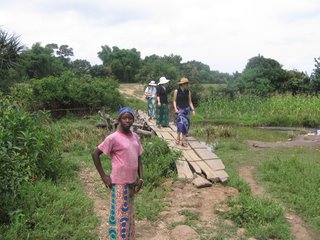I met up with Marie, a volunteer friend from the Basse Cote (western coastal region), and traveled out east to Haute Guinea. We met our friend Amanda in her small village, Selouma. It was a great mini-reunion. We went on a walk beneath the mountain overlooking her village (with chimps on it!) and slept in her hut, before continuing on to the regional capital of Haute, Kankan.

Marie and Amanda in Selouma
I expected Kankan to be hot, dusty, and dry, but it was quite green, the streets lined with trees. We enjoyed catching up with volunteers out in that region that we don'’t get to see that often. We visited local craftsmen and I bought wood and cowbone necklaces and passport masks from the forest region. The ebony wood craftsman let Marie try working some ebony.

Marie working ebony in Kankan
We taxied out for the weekend for the fish fete, an annual celebration in many villages off the Niger River. The festival celebrates the start of fishing season for the ponds formed in the floodplain of the Niger. They celebrate fish fete right before the rainy season washes the Niger back into the floodplain, emptying the ponds of their fish. Drummers and dancers come for the celebration.
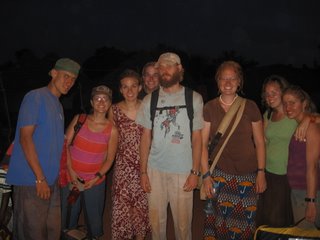
Dusty after the taxi ride

Sharing a bowl of rice and sauce
We went to a small village named Nounkounkan. There was a huge opening ceremony where all of the performance groups in attendance did a short introduction. There were dancers, singers, traditional instruments, skits, and drummers. They even made the Peace Corps do a performance, so we disco-walked out in the circle and did the macarena with an AIDS prevention chant. Embarrassing, but hilarious. Each evening had small circles of drumming and dancing throughout the small village. We got stuck in a downpour and took shelter with a group of musicians playing the kora, a traditional instrument, and danced until the rain stopped.
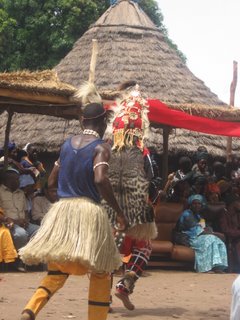



After a few days of dancing and drumming, Sunday morning the village made the call to fish. Everyone streamed down the path to the fish pond, carrying fishing implements. People rushed the water all at once and fishing began. It was a madhouse, the water packed full with people. I walked the perimeter of the lake and a man threw me a big fish from the water. From then on everyone there thought I had caught a fish and were quite impressed. A group of sword dancers singing and shaking their swords in single file around the lake changed their song to "the white girl caught a fish"” in Malinke.
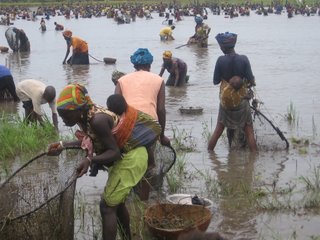
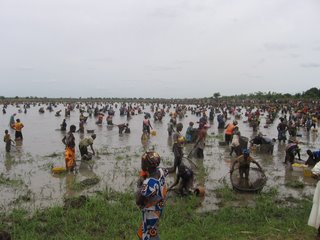
After the fish fete ended, a few of us continued on to a neighboring village, Niandankoro. We swam and did laundry in the lazy Niger and slept in our friend's hut. Her homestay family served us the main dish, To, made of pounded manioc, spongy and slimy in consistency. They serve it with a salty green sauce. Her homestay mom gave birth to her 13th baby that night!

Walking to Melinda's hut in Niandankoro

The Niger River

Colin carrying laundry back to the hut

